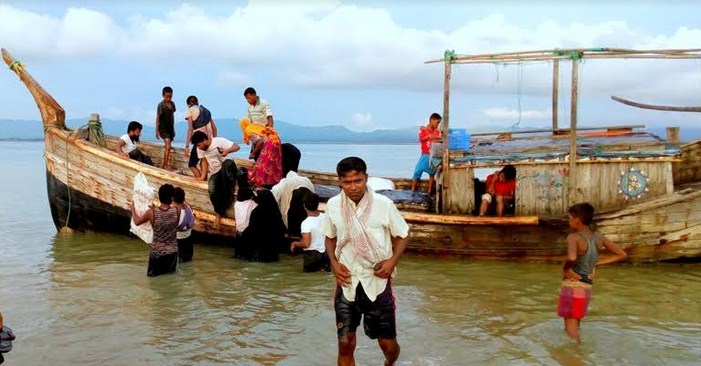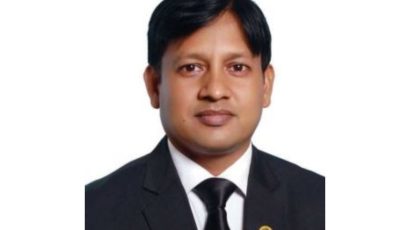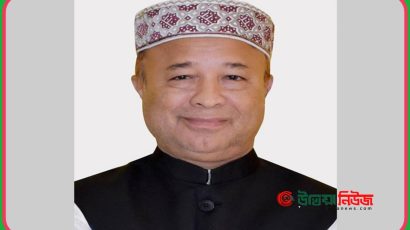
News desk::
He trekked to Bangladesh as part of an exodus of a half million people from Myanmar, the largest refugee crisis to hit Asia in decades. But after climbing out of a boat on a creek on Friday, Mohamed Rafiq could go no further.
He collapsed onto a muddy spit of land cradling his wife in his lap _ a limp figure so exhausted and so hungry she could no longer walk or even raise her wrists, according to The Economic Times.
The couple had no food, no money, no idea what to do next. Their two traumatized children huddled close beside them, unsure what to make of the country they had arrived in just hours earlier, in the middle of the night.
Rafiq said their third child, an 8-month-old boy, had been left behind. Buddhist mobs in Myanmar burned the child to death, he said, after setting their village ablaze while security forces stood idly by _ part of a systematic purge of ethnic Rohingya Muslims from Buddhist-majority Myanmar that the United Nations has condemned.
“We don’t ever want to go back,” a stunned Rafiq said, describing his family’s ordeal as Bangladeshi volunteers stuffed a small wad of cash into his hand and gave their children biscuits. Another man offered a bottle of water, and Rafiq poured some into his wife’s mouth as she lay in his arms, staring blankly at the sky.
“This is not our home. It is not our country,” Rafiq said. “But at least, we feel safe here.”
Five weeks after the mass exodus began on Aug. 25, the U.N. says the total number of arrivals in Bangladesh has now topped 501,000. And still, they keep coming.
Not all those who have fled over the last few desperate weeks have survived. The International Organization for Migration said more than 60 refugees were confirmed dead or missing and presumed dead after one vessel capsized in rough seas in the area Thursday.
The crisis began when a Rohingya insurgent group launched attacks with rifles and machetes on a series of security posts in Myanmar on Aug. 25, prompting the military to launch a brutal round of “clearance operations” in response.
Those fleeing have described indiscriminate attacks by security forces and Buddhist mobs, including monks, as well as killings and rapes.
While the international community has condemned the violence and called on Myanmar to protect the Rohingya, Sufi Ullah, a police officer in Teknaf, said nothing has changed.
“We’re seeing them come across whenever they get the chance,” Ullah said. “They’re hiding in the forests and hills (inside Myanmar) in the daytime.
And when they get the chance, they run. The Myanmar army is putting pressure on them. These people are afraid.”
Ullah said several thousand new refugees arrived by boat in Bangladesh on Friday, and authorities were not expecting the flow to let up anytime soon.
On Friday, dramatic scenes played out over and over as hordes of Rohingya who had crossed into Bangladesh overnight tried to make their way further inland. They trudged out of boats and through mud that in some places was knee deep. Men carried babies and old women on their backs. Everyone was exhausted.
Sonabanu Chemmon was among those too weak to walk. Her son-in-law had carried her to one of Bangladeshi’s inland creeks, near Shah Porir Dip. But he then abandoned her along with several of her adult daughters.
Asked why Chemmon covered her eyes as tears fell down her cheeks.
“He said he had carried me far enough, that he couldn’t carry me anymore,” she said. “He told me, `You can make it from here. I have to look after my own children.”‘ Chemmon was finally helped by several Bangladeshis who are among a small army of local citizenry collecting donations, food and clothing, and handing it out to desperate new arrivals.
“Some of these people haven’t eaten or slept in days. They’re so weak, they can’t even walk,” said Mohamed Ismail, a Bangladeshi volunteer who travelled here from the city of Chittagong.
“I’ve never seen anything like it. They have nothing. It’s painful to watch,” he said, turning away, overcome with emotion. “Bangladesh is not rich, but we have to help.”
Karim Elguindi, who heads the U.N. World Food Program office in Cox’s Bazar, described the scene Friday as “distressing.”
“There are more and more people coming and there’s not enough space in the existing camps” to accommodate them, said Elguindi, who was touring the area after hearing a new influx was underway. “I don’t know how many Rohingya are left in Myanmar … but there’s more on the way.”
Elguindi said many of the refugees had been travelling for five days or more, and many were not carrying food during the journey. “These people are very vulnerable, very hungry … they need shelter, they need water.”
Myanmar’s government, led by Nobel Peace Prize winner Aung San Suu Kyi, and it’s still powerful military do not allow independent media free access to northern Rakhine state, from where the Rohingya are fleeing. While fires are no longer visible from the Bangladeshi border, some refugees told The Associated Press that their homes had been burned as recently as two days ago.
Rafiq said he and his wife, Noor Khatum, fled their home in the Maungdaw village in Khai Dar Para in the first week of September after police and soldiers moved in and Buddhist mobs, including monks, set fire to homes there in the middle of the night.
Rafiq managed to get his 5-year-old daughter out, while his wife carried their 2-year-old son. But their house, made of wood and sticks, burned quickly, collapsing on their baby boy before they could save him.
After fleeing, they took shelter with relatives in another village, but several days later that village, too, was torched by Buddhist mobs. Rafiq and his family then hid with others in an abandoned house near the border for two weeks but had no money to pay boatmen to take them across the Naf River to Bangladesh.
So for two days, Rafiq helped other families escape, carrying them and their goods in exchange for amounts of cash. On Friday at 3 a.m., his own family finally made it out.
Now, in Bangladesh, a far more uncertain chapter of their lives has begun.
“We don’t know where we will go,” Rafiq said forlornly, as a long line of families trudged single file toward the town of Teknaf, where authorities were assessing the new arrivals and trucking them to camps further north. “We have nothing. We don’t know what we will do.”








পাঠকের মতামত